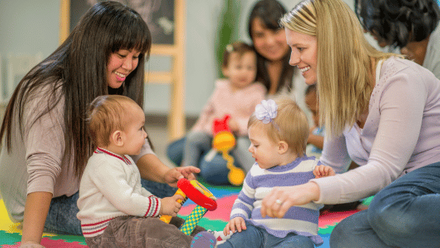The importance of staff supervisions (England regulations)
In England, staff supervisions are statutory for any staff member working directly with children and their families. Staff supervisions, as a statutory procedure, are sometimes in danger of becoming ‘tick box’ exercises to fulfil our regulatory duty. But effective staff supervisions can help us work together and cultivate a culture of collaboration in the best interests of the child.
In this article, we are going to have a look at what staff supervisions involve and why they are important for keeping children, and ourselves, safe.
What is staff supervision?
Supervision should foster a culture of mutual support, teamwork, and continuous improvement, which encourages the confidential discussion of sensitive issues.
Staff supervisions are a prime opportunity to meet one-to-one with staff members working in the setting to discuss matters of personal importance, professional development and a time to highlight any issues or concerns. Every staff member, regardless of their position or qualifications, within the setting should receive a supervision invite.
Topics for staff supervision might include:
- Personal administration, including any time they were absent from work, any upcoming holiday plans or changes to circumstances that might impact their ability/suitability to work.
- Professional opportunities, such as discussing areas of challenge within work and identifying new targets to work towards. It might include exploring avenues for progression that can be supported within the workplace.
- Child-specific conversations, including a focused discussion on key children to highlight any emerging concerns or insights. These might relate to their learning, development or wellbeing.
The frequency and length of these meetings can vary from setting to setting as this is not stipulated by Ofsted for English statutory procedure.
We know that effective communication with parents and carers is essential to improving the standards and quality of education and care provided in the early years, but little emphasis is placed on the communication between colleagues to further practice from within.
Working in early education and care is a busy place to be! Staff supervisions give professionals the space to discuss and invest time in their own development, exploring avenues for progression that often escape us when working in a child-centred environment. For this reason, staff supervisions are highly valuable for engaging individuals in their own development and empowering the workforce to excel.
But staff supervisions also take a vital place on the stage for supporting child development and monitoring the progress of individual children in their learning and wellbeing. These unique one-to-one conversations promote a strong sense of confidentiality to discuss specific children and concerns that might emerge.
Important: Supervision spaces do play an important part in maintaining a safe environment, but any safeguarding concerns should be flagged as soon as they appear, rather than waiting for a supervision to arise, following your safeguarding policy.
Using templates to keep things on track…
Time out of the room with children is scarce and precious. Ratios must be maintained whilst supervisions are conducted which means we need to think carefully about time to conduct supervisions safely. Because of this, it’s critical that we keep to time to maximise the opportunity we have.
Templates that follow your supervision policy can be useful for creating an agenda for supervisions to ensure you hit all the topics of conversation that cover the main aims of the meeting. This might include:
- updates to personal circumstances, including personal disclosures
- what has gone well recently, sharing examples of best practice
- any difficult situations or areas self-identified for improvement
- comments based on observation to identify areas of development
- review of last targets and development of these, including creation of new goals if needed
- discussions relating to individual children and their overall development, including any welfare concerns.
…but making sure things aren’t too regimented
These spaces of review are an opportunity not only for management to gain an insight into their staff’s performance but also a chance for individuals to ask about areas of practice and development within the wider setting and sector. The supervision should be a two-way dialogue that facilitates growth as much as celebrating success and identifying challenge.
Whilst templates are useful for keeping things on track, make sure there is space to extend on conversation where necessary and create time to ensure individuals feel truly listened to and not rushed. This might involve arranging another time to develop on matters within the supervision or to alter the course of the meeting to focus on the parts that appear most important. This sends a core message that staff voice is valued and allows us to prioritise areas of welfare and concern that matter most to keeping everyone healthy, happy and safe.
Creating a safe and confidential space…
Staff supervision is often the only time for individuals to have a confidential space to talk about any concerns they might have. Initiating conversation that is built on foundations of trust is a key component of effective supervision.
A safe space is one that listens to others but also offers impartial and supportive advice where appropriate. A supervision might become an emotionally charged situation: an individual might choose to disclose personal circumstances or highlight an area of concern they have at work. It is important to remain supportive, reassuring and positive in this kind of scenario to provide the best possible care for the staff member’s welfare and use the supervision to create a plan of next steps for moving forward.
…whilst also fulfilling our duty of care to others
A strong emphasis on confidence in the privacy of a non-judgemental and supportive workplace can allow individuals to express their concerns and discuss topics of a more sensitive nature, including staff wellbeing and child welfare concerns. However, supervisions are bound to the same duty of care as any other form of disclosure. Where concerns need escalating, just as we tell children that we cannot keep secrets, it should be made clear that additional action needs to be taken.
Key Takeaways
Staff supervisions are, in England, regulatory for all staff working with children and their families. However, they have the potential to hold a valuable place in all settings to provide an effective framework for staff development as well as a crucial opportunity for raising concerns in a confidential space. Giving staff a regular opportunity to highlight any problems goes a long way towards creating a positive culture in the workplace where children, and adults, feel safe, comfortable and happy.
NDNA have a vast range of policies and guidance to support creating meaningful and comprehensive supervisions for all staff. Take a look!





